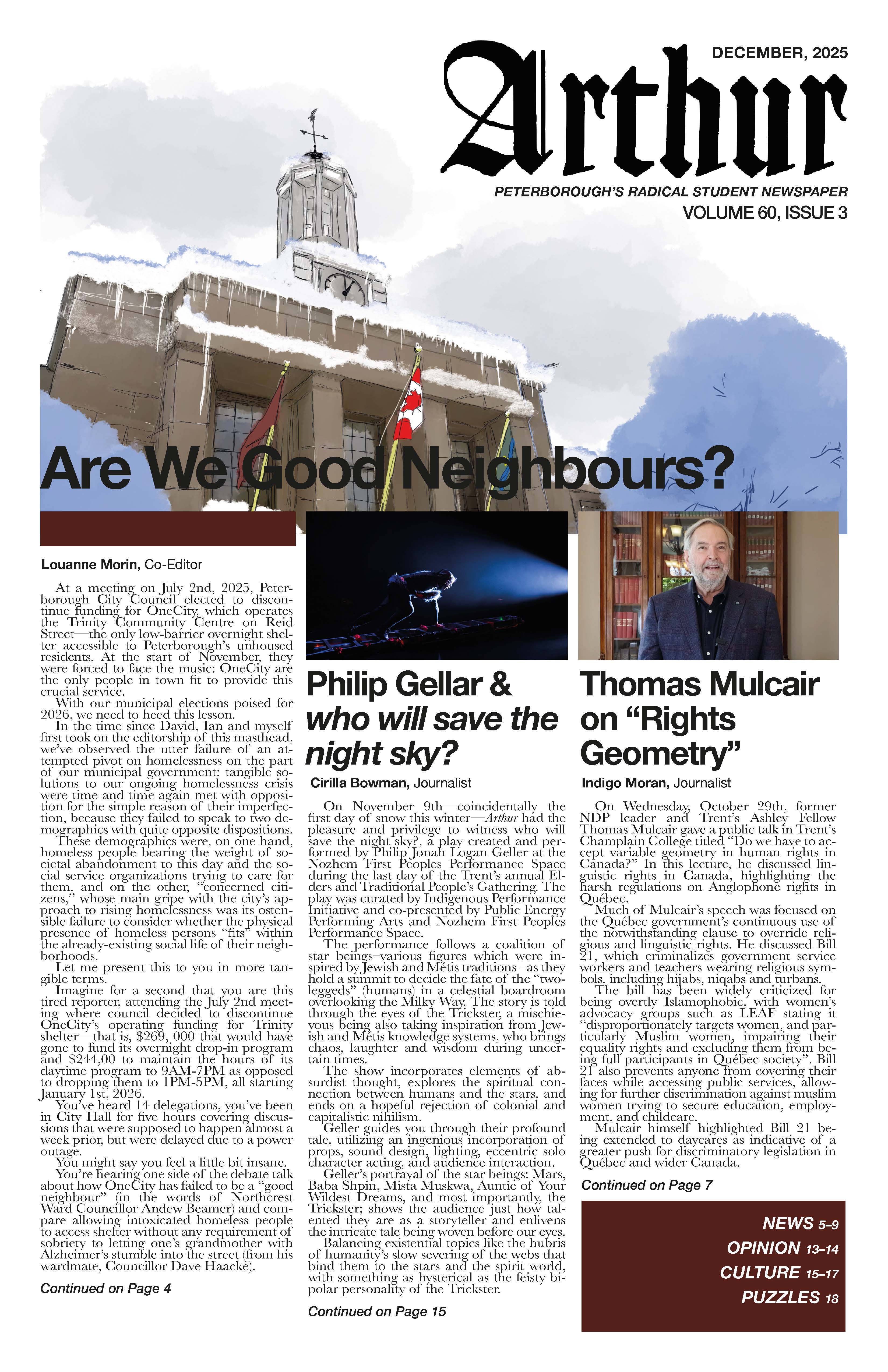I—speaking as one-third of Arthur’s Volume 58 editorial team—am biased.
Biases exist in every aspect of human life. It is within our nature as human beings to attach ourselves to familiarity, routines, and ideologies that we agree with. Nobody likes to feel uncomfortable, nobody likes to step outside their proverbial comfort zone and immerse themselves into a community they do not understand, approve of, nor relate to.
When it comes to news media, it is not only difficult but also dangerous for publications to pretend that they do not uphold certain biases in their reporting. This is not to say that the intent to release unbiased reporting is morally wrong, however, it is merely to outline that there is no such thing as 100% completely unbiased reporting, and any organization that claims otherwise is lying. A fundamental aspect of media literacy is understanding that different publications operate on different biases.
Politics and subsequent political news outlets have become an epicentre for division and hostility. I won’t attempt to dissect this subject matter in its entirety, but to gloss over a very, very complicated topic—biases in media exist to attract a certain audience. I want to make it abundantly clear that biased news outlets are not inherently a malicious attempt to capitalize on the prejudices within a certain demographic of people solely to gain viewership, perpetuate violence, and increase profit—to that, I will point you to a certain alt-right program that I’m sure came to the fronts of all our minds while reading said description.
To pretend that one is void of all surrounding biases while reporting on any subject political in nature is—in my biased opinion—extremely harmful. It is both the responsibility of the news organization and, in part, their readership, to be critically aware of the publication’s ethos as a whole before taking printed word as wholly fact.
For a fruity little example, let us dissect Arthur’s long history of biased publications. To anyone familiar with Arthur, it may come as no surprise that this editorial team and editorial teams of the past have continuously run the masthead as a radical platform to spotlight issues faced in this community. Arthur is not, and has never been, a place where hateful rhetoric, harmful ideologies, and overall is allowed to flourish. As raunchy and greasy as this beautiful rag can be in her star moments, Arthur is anything but neutral when it comes to the betterment of this city and has continuously highlighted major issues faced in the Trent/Peterborough community since 1966. To remain neutral as an independent student press is to indirectly align oneself with the problem. No action only results in further enabling of corrupt and unstable institutional powers in play.
As a representative of Arthur, I too am anything but neutral when it comes to the municipal politics of Peterborough. This city is at a vital point in its history—a point where monumental change is within the near future, or rather all attempts at combating corruption within this city will cause it to crumble before our very eyes with only the over-privileged capable of affording to frolic within these cracked streets.
To put it bluntly, there is no time to remain neutral. Arthur is not that kind of gal, and I certainly am not that kind of journalist.
I have been reporting on City Hall and writing weekly recaps for the better portion of two months now. Believe me when I say that I had every intention to remain as neutral as possible in my reporting. It came as a bit of a wake-up call when the first meeting I attended was focused on the modular housing proposal—a proposal which fundamentally cemented certain councillors and their opinion on providing aid to those facing unimaginable situations as something of an annoyance to their otherwise busy schedules of ignoring municipal emergencies.
When councillor Dave Haacke, for example, suggested involuntary treatment centres and painted unhoused individuals as dangerous criminals while subsequently voting against providing support for the city’s most vulnerable, it is safe to say his ideologies were enough for me to change my approach as a journalist altogether.
Everything within politics works on a bias. Whether it's personal, financial, or even spiritual, human beings operate on a set of preconceived beliefs that fundamentally influence their day-to-day decisions.
City councillors are no exception. A diverse range of biases can—in theory—make for an equal and fair representation of people’s voices being presented at the horseshoe table. However, there seems to be a clear-cut divide between those councillors who are fundamentally unwilling to stray from their preconceived notions to even listen to proposals being brought forward; and those who take their jobs for the serious nature that comes with the territory of municipal democracy.
It truly is telling when I can see clearly in front of me council members who operate on their own agenda to keep a pristine public image—however differing our opinions are on what constitutes a ‘good’ image—and merely attending council meetings solely to say that they did in fact, fulfill their role as a public figure.
It is shameful, to put it bluntly, how a majority of council members refuse to acknowledge, much less take interest in the crumbling state of this city. Rather, it seems to be a running theme that councillors will use the deteriorating facets of Peterborough to gain sympathy votes when in actuality, there seems to be two different cities being represented in council chambers.
One Peterborough is the one you and I live in. One where the housing crisis falls nothing short of a heinous nightmare with a lack of support from not only Trent University and its continuous promise to over-enroll students without the means to house them, but councillors themselves. In this city, the unhoused people of Peterborough are human beings who deserve equal treatment and accessible support systems because, after all, a city cannot fundamentally survive when a large demographic of its residents are being judged as hostile infringements onto the lives of the upper-class, while simultaneously being denied fast and available services to improve their quality of life. In this city, the consequences of inaction by elected officials are felt far and wide. People are fed up, tired, and adamant that their voices be heard.
In the opposing city, neither of us are anywhere to be found. This city is centred on the privileged upper class who fantasize about a shiny new sports arena while they drive past vacant bus lines and encampments on shoddy roads during their commute to work, all the while shaking their head at the less fortunate for their inability to pull themselves up by their bootstraps while simultaneously being denied access to the proverbial bootstraps in question.
Like most sound-minded people, I wholeheartedly believe in equal and accessible housing for all, a budget that actually reflects the severity of the multiple crises seen in this city (including defunding the over-inflated police budget), better infrastructure, reliable and accessible support services and increasing harm reduction for our most vulnerable residents. I know I do not share the beliefs of every resident in Peterborough. However, I know for certain I share the same beliefs that a majority of students, young people, and activists in this city do.
Peterborough is out of time to beat around the bush.
Though my confirmation of biases for fundamental human rights may cost Arthur a reader or two, it does not take away from the biggest picture that Peterborough City Councillors have been consistently flirting with performative activism under the claim of working for the betterment of Peterborough for years now. It can be extremely difficult to highlight meaningful change presented by councillors who do actually feel empathy when attainable means for action are continuously overshadowed by councillors who see their position as a means of self-promotion and self-idealization, rather than a vessel for the voice of their respective wards.
Peterborough has a long-standing history of slow-rolling change at the hands of councillors who cannot, nor will not, take off their rose-coloured glasses and stray away from performative platforms and tearing apart anything, or anyone remotely resembling some sense of progression to shreds—further perpetuating the notion that a large majority of this city is afraid of change.
With personal gain and upholding public image overshadowing the very real potential Peterborough has to become a city one can take pride in, it only further perpetuates my bias that one cannot claim to willfully represent a ward when failing to take into account the concerns faced within.
With a booming arts and culture scene, students who are hungry for change, and a diverse food industry, Peterborough has the means to become a grand and beautiful city. However, such a future is not possible when the core fundamental issues holding this city back are not being adequately addressed.
That being said, as cynical as my inherent nature tends to be, I do believe wholeheartedly that change is possible. I want to be very clear here that when speaking to the overall doom and ruination of municipal bliss, there are very clear exclusions. I feel it is my responsibility as a student, journalist, and resident to continue to highlight those councillors who fight for this city with passion, logic, and most importantly: dignity.
Councillors Alex Bierk and Joy Lachica are at the forefront of the movement to cement Peterborough as a city people can take pride in. One where the divisions that so heavily separate the people of Peterborough can be combated and dismantled; one where life-saving harm reduction is not a controversial topic; and one where Peterborough’s glorious arts scene gets the funding and recognition so desperately owed to its creators, who pave the way for the uniquely special cultural scene that keeps this city alive.
In writing this, I understand that politics is anything but straightforward. No, this is not an advertisement for Bierk and Lachica and yes, there are other councillors who work towards the betterment of this city as well, such as Councillor Kieth Riel who recently has made prudent strides in his council seat that is nothing short of admirable. For anyone who has ever tuned into City Council meetings either virtually or in person, Riel’s passion is hard to miss. From his adamant rejection of spending a gross amount of money on a new Sports Arena the city frankly does not need given the multitude of emergencies as of yet to be addressed, to his partnership with Bierk on the modular housing proposal, Riel—the wildcard that he is—has proved that there is momentum behind desperation for change. His colleagues across the table, however, have yet to see past his enthusiasm,
It is, however, worth a direct mention of these two councillors for their continuous perseverance to shed light on the raging issues facing the City of Peterborough. With every divisive and self-serving councillor that carries meaningless debacles on subjects they fail to take the time to comprehend, Bierk and Lachica never fail to speak from real experiences and an unwavering passion for the people they represent.
I have grown up here and have watched this city shapeshift into something nearly unrecognizable. No, Peterborough has never been perfect and no, no city will ever achieve a level of progress that is deemed perfect by every resident. There is no vote to please everyone and no council that checks all the boxes. There is, however, a bottom line when it comes to a city council that adequately represents the people of this city. With this current council, I fail to see this representation take light.
Change—despite the opposing forces within—is possible for Peterborough, and it starts with councillors like Bierk and Lachica.
When council members prove time and time again that their actions—or lack thereof—do not in any way shape or form speak to the concerns faced in their wards, I will not hesitate to use my coverage on this platform to report on the mishandling of power.
Take my final bias of this article that holding not only institutions, but people in elected power accountable is fundamental to achieving the changes this city so desperately needs.


.png)


.jpg)


.jpeg)



.jpg)


.jpg)

.jpg)
%20(1).png)

.jpg)
.jpg)



.png)